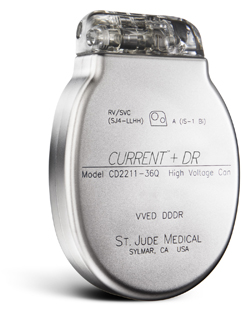 |
UNMC’s John Schereshel, M.D., recently peformed the first installation of the SJ4 implantable cardioverter defibrillator in the state of Nebraska. (Photo contributed by St. Jude Medical) |
The procedure was performed July 30 at the VA Nebraska-Western Iowa Health Care System’s Omaha Medical Center by John Scherschel, M.D., assistant professor in the UNMC Department of Internal Medicine, section of cardiology.
“It’s a significant breakthrough … the simpler the device, the lower the risk of complication or failure,” said Dr. Scherschel, a cardiac electrophysiologist, joined the UNMC faculty on July 1. “Patients are the real benefactors of this new technology.”
The patient, 75-year-old Eddie Fidler of Clarinda, Iowa, is out of the hospital and has returned to his normal activity level. He is pastor of the Church of God in Clarinda.
|
The new system reduces the volume of device in the chest wall and that should help add to the patient’s comfort level, said Dr. Scherschel, who completed a fellowship in clinical cardiac electrophysiology at the Krannert Institute of Cardiology at Indiana University School of Medicine before he came to UNMC.
The SJ4 features a single connection between the device and the defibrillation lead, and a single set screw. Previous defibrillator lead designs required three separate connections and four set screws.
With fewer connections to make, the SJ4 reduces the time it takes to implant the ICD and thus reduces the risk of infections and incorrect connections, Dr. Scherschel said.
Another major benefit to patients, Dr. Scherschel said, is that the lead and ICD are part of a system that allows patients to be monitored remotely.
St. Jude Medical has a long history of working with the VA Nebraska-Western Iowa Health Care System, Dr. Scherschel said, so that’s why it was selected to be the first site in Nebraska and the first VA medical center in the country to use this exclusive technology.
If patients express a preference for the SJ4 device or if there is a medical need for it, Dr. Scherschel said he would be able to use the device for future procedures performed at The Nebraska Medical Center, UNMC’s hospital partner.